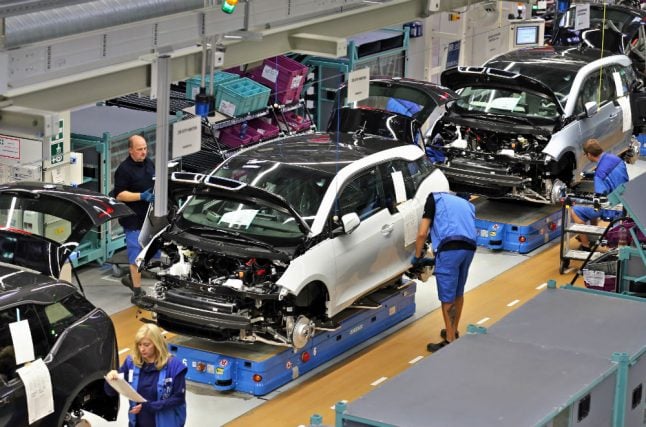The IG Metall union, which commissioned the study along with BMW, Volkswagen, Daimler and a string of car parts makers, said the pivot towards cleaner engines posed a “major challenge” to Germany's biggest industry, which employs more than 800,000 people.
Electric engines are simpler to build and require far fewer parts than petrol- or diesel-fuelled cars.
According to the study, carried out by the Fraunhofer Institute, the shift will eliminate 100,000 of the 210,000 jobs in drivetrain manufacturing by 2030, while around 25,000 new roles will be created linked to batteries and other specific requirements for electric cars.
The figures were calculated on the assumption that by then, 25 percent of all cars on Germany's roads will be fully electric, while another 15 percent will be hybrids, which combine an electric motor with a traditional internal combustion engine.
Today, these cars account for less than two percent of the market.
SEE ALSO: German automakers are biggest global spenders on electric cars: study
IG Metall chief Jörg Hofmann said the government and company bosses needed to take urgent action to prepare the industry for the upheaval, including through retraining schemes.
But he also warned that not everyone would survive the electric revolution.
“There will be suppliers who won't be able to adapt their business model, especially among small- and medium-sized companies,” Hofmann told reporters in Frankfurt.
Whereas it takes some 4,000 workers to assemble a million gasoline-powered engines per year, just 1,840 are needed to build the same number of electric motors, the study said.
Volkswagen's staff representative Bernd Osterloh told reporters that the car giant would respond to the changes by phasing out jobs through retirement schemes and “using the opportunities presented by the transformation”.
Despite being home to some of the world's biggest and best known carmakers, Germany's auto industry was slow to focus its attention on the greener, smarter vehicles of the future — allowing newcomers like Tesla to take the lead.
But German firms have stepped up their efforts in the wake of Volkswagen's 2015 “dieselgate” emissions cheating scandal, which badly damaged the reputation of diesel cars and spurred a push towards more environmentally friendly engines.
READ ALSO: German auto companies 'at forefront' on key electric car technology



 Please whitelist us to continue reading.
Please whitelist us to continue reading.
Member comments